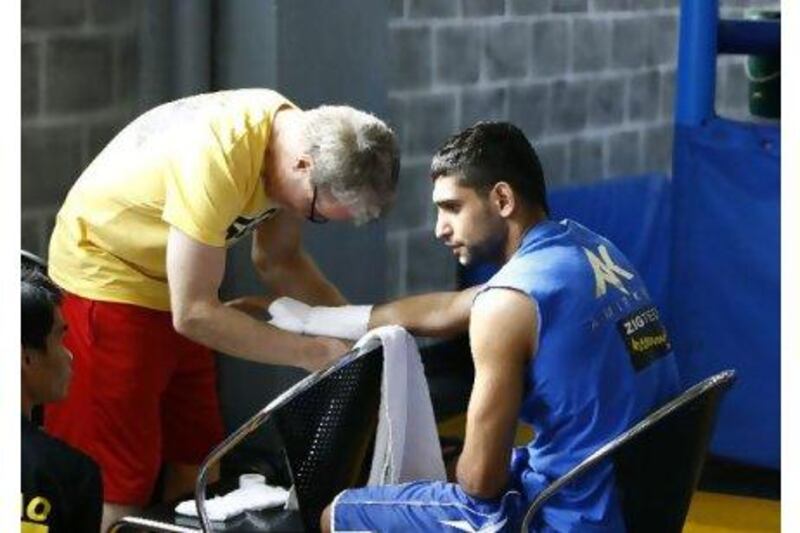Into the boxing gym that livens up the third floor of one idiosyncratic hotel in Baguio City walked a star, but no, not that star.
His movie-star face seemed displaced at first, like one of those dreams in which familiar people turn up in kooky places.
You mean way up here in the northern Philippines, and … Amir Khan?
__________________________________________
The Manny Pacquiao Story
• Interactive: The Manny Pacquiao story
• Part one of the Pacquiao story: In Mannyland
• Part two of the Pacquiao story: Unchanged by fame
• Part three of the Pacquiao story: Team Pacquiao
• Part four of the Pacquiao story: A bittersweet farewell
• He's the best, but Manny Pacquiao is still learning to be better
__________________________________________
Oh wait, wait, of course, as Khan, too, trains with Freddie Roach and Khan, too, has a fight upcoming, this very Saturday evening in Manchester.
So on the Baguio afternoons of late March, after the Manny Pacquiao clamour would hush and sometimes adjourn upstairs for that star's basketball obsession, Khan would follow Pacquiao into the ring with Roach.
Nearly everybody would leave, and there would train an accomplished young man with a big life and an Olympic silver medal and a personable tenor.
"Amir Khan," he would walk up and say to strangers, extending a hand for introduction.
Yes, he certainly, verifiably is Amir Khan. Unmistakable, especially if you ever resided in the UK, where you might wake and see him chatting on a BBC sofa and reckon that when they handed out the charisma he got in line thrice.
At 24, he mines the path toward his own prime in the vicinity of a certain Filipino fighter amid a prime sublime.
"I think Manny's a great model for him," Roach says.
Before getting to Pacquiao in Las Vegas on May 7, Roach has Khan in Manchester against Paul McCloskey, and Khan has one of the better weekends of his life.
He will fight again before his fans in the north west of England. And the Bolton Wanderers he has adored pretty much from birth will play a humongous Bolton moment against Stoke City in an FA Cup semi-final at Wembley Stadium.
On his website this week, Khan proclaimed himself "quicker than I've ever felt" and said of Pacquiao, "He gave me some great words of advice that I'm going to take into this fight."
He is a fighter progressing under Roach.
"You know, the turning point in Manny's career came with the Diaz fight, that was almost seven, eight years together at that point," Roach said, referring to Pacquiao's defeat of David Diaz in June 2008 during which Pacquiao's right hand complemented his left unprecedentedly.
"I'm probably in my third year with Amir, and I don't know if that will take seven, eight years, but maybe he'll be in his prime in maybe two or three.
"He's progressing, but he still has trouble with certain styles, certain adjustments. He's very athletic, like Manny - very fast, has speed and power. He has a lot of things that Manny has naturally, he just doesn't know how to use them to the best effect yet."
Khan became recognisable enough to grace BBC furniture during the Athens Olympics in 2004 with a lightweight silver medal at the age of 17.
He went along unbeaten until September 6, 2008, when the Colombian walloper Breidis Prescott changed that to beaten within 54 seconds.
From there, Khan moved from Jorge Rubio to Roach and to Los Angeles.
Roach's opening tactic? He put Khan in the ring with Pacquiao. His method: "Erase that loss," Roach says. "Fight the best fighter in the world, today."
If he could mingle competitively with the best fighter in the world - today! - it should shore up his confidence. And he did mingle competitively. They went five rounds, Roach says, and: "The first four rounds were about even to Amir having a slight edge. After four, Manny's brain takes over."
It must have been some sight in Roach's gym in Los Angeles, two big auras crammed into one ring, Pacquiao with his astounding storyline, Khan with the multicultural construct of England and Pakistan, and his frequent raving to Roach about the glories of Dubai.
"When they get in there," Roach says, "the intensity's way up, 'cause they've both got to be at their best to compete against each other."
Unprompted, he then speaks of any future fight between the two with, "I don't think that'll ever happen. Too much respect and friendship … I told Amir, I said, 'You can never say never, of course'."
It does turn out, though, that Khan's mind does sport a most encouraging aspect, relayed by someone not prone to sugarcoating.
"He's a really good student," Roach says. "He listens really well. He tries hard. He's an ideal student … I think his knowledge of boxing is so limited, that's why he listens so well. He's still like a kid at times."
That, Roach agrees, would not always be the case in the world, a young star knowing what he does not know, not bathing in his own stardom, walking up to introduce himself.





